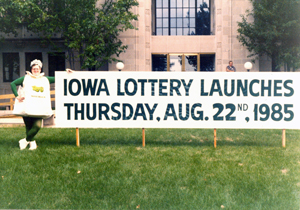Lottery hits 30
Will new games, noncash prizes, world lotto emerge in future?

PERRY BEEMAN Sep 11, 2015 | 11:00 am
3 min read time
753 wordsBusiness Record Insider, Economic DevelopmentAny business that survives 30 years has to think about what to do to stay relevant for the coming decades. The Iowa Lottery is no different.
CEO Terry Rich, not surprisingly, has a few ideas. Like offering lottery games via mobile phone. And perhaps offering a European or worldwide lotto. The lottery might offer unconventional prizes once in a while, like Super Bowl tickets.
And don’t be surprised if you see a $1 billion lotto jackpot sometime.
The immediate plans are a bit more modest. As the lottery continues to settle into its lodge-like headquarters, the former home of collapsed broker-dealer DeWaay Financial Network LLC at 13001 University Ave. in Clive, it has rolled out a new game in honor of its 30th anniversary, a $5 scratch game named “30 Somethings.” The tickets are printed on paper made of 60 percent recycled fibers.
Even as new ideas emerge, though, the organization is taking time to consider its history.
The lottery started selling tickets on Aug. 22, 1985, at the Iowa State Fair. The betting was a long time coming. Iowans had voted in 1972 to change the state constitution to remove a ban on lotteries.
Gov. Terry Branstad on April 18, 1985, signed the legislation authorizing the lottery after twice vetoing it. He had called the lottery “pure gambling” that shouldn’t be supported by the state. He questioned whether the lottery would generate the $45 million that supporters predicted. Many Iowans — who had voted by more than a 2-1 margin to approve an Iowa lottery — had traveled to Illinois to buy lottery tickets, then mailed them to Branstad if they didn’t win.
In the first full year of operations, the lottery delivered $31.2 million in proceeds. It took until 1992 to top $45 million. Then competition from casinos and a change in the betting age from 18 to 21 dipped the take under $45 million from 1997 to 2002.
The proceeds have risen ever since, hitting just under $74 million in the budget year that ended in June 2014. Sales for the year that ended this June 30 were up slightly at $74.5 million.
The trick long term is to keep the games fresh and keep the 2 million Iowans of playing age interested, Rich said. The lottery sells almost $1 million in plays daily. By far the most popular are the scratch games, accounting for 60 percent of sales, but the lottos can heat up, too. Pull tabs aren’t the craze they once were.
Of course, winning can grab one’s attention. The lottery has amassed $1.6 billion in sales, including 127 tickets that won $1 million or more. There have been changes over the years that made it both harder to win a lotto jackpot and easier to win smaller prizes. “People need to win, or they won’t play,” Rich said.
One prize that wasn’t awarded: A $14.3 million jackpot that was the subject of fraud charges against an information-security worker for a lottery vendor who allegedly bought the winning ticket. A jury in July convicted him of rigging the game.
Rich noted that the multiple layers of security already deployed raised questions about the situation and led to an investigation. Security will continue to be a priority, as will responsible playing. Should the lottery move toward mobile phone access to games, the app could be set with a limit on daily plays, for example, to guard against problems with gambling addiction, Rich said.
Among the possible new products could be scratch games that cost $15 or $20 and have bigger prizes, Rich said. Currently games cost $1 to $20, and prizes have ranged to $1 million for the scratch games, which have brought record sales as gas prices fell and customers felt like they had a little extra cash, Rich said.
Through March, the lottery had funneled $1.6 billion to the state for various expenditures. Of that, nearly $1.4 billion went to the general fund, and the governor and lawmakers allocated it to education, natural resources, health, public safety and other services. The remainder went to the Iowa Veterans Trust Fund, environmental programs, economic development efforts, a treatment program for gamblers, special appropriations and other services.
Rich said the lottery will be looking for more social games, and perhaps special prizes such as tickets to high-profile sports or other events, or perhaps the latest iPad.
Possible new products
1. European or world lotto
2. Games with prizes such as iPads
3. Scratch tickets with higher prices and bigger prizes









